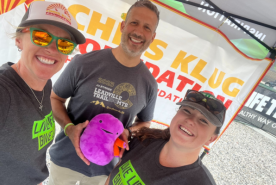Insurance Options
Medicare helps Americans and legal residents of all ages who have worked and paid taxes into the system, and need dialysis or a kidney transplant. More than 90 percent of Americans with kidney failure, what Medicare calls End-Stage Renal Disease (ESRD), have Medicare.
Medicaid helps pay medical costs for people with low income and little savings. Medicaid can pay your Medicare premiums, deductibles, co-insurance and some costs Medicare doesn't cover.
ACA Marketplace: The Affordable Care Act Health Insurance Marketplace, helps people without health coverage find and enroll in an insurance plan that fits your budget and meets your needs.
Employer group health plan (EGHP): Coverage sponsored by an employer or union. If you either you, your spouse, or your parent (for children up to age 26) are working you may be eligible for insurance through your (their) employer. Employers with 50 full-time employees or more must offer insurance to their employees.
Other Insurance options
Children's Health Insurance Program (CHIP) provides health coverage to children in families with incomes too high to qualify for Medicaid but can't afford private coverage. (877) KIDS-NOW / (877) 543-7669 www.insurekidsnow.gov
COBRA: Allows an eligible employee who leaves a company to continue to be covered under the company’s health plan for a limited period of time for a higher premium.
Indian Health Service is a Federal Health Program for American Indians and Alaska Natives.
Medicare Advantage – is a type of Medicare health plan offered by a private company that contracts with Medicare to provide you with all your Part A and Part B benefits. People with ESRD are not eligible to apply for these plans, but some may already be enrolled in a Medicare Advantage plan before starting dialysis or needing a transplant.
Medigap Plans – Supplemental plans for Medicare recipients that helps cover what traditional Medicare does not, such as copayments, coinsurance, and deductibles. This includes the 20% not covered by Medicare Part B for outpatient services (i.e. dialysis) and immunosuppressant medication for transplant recipients. You can sign up for a Medigap plan in the six-month period after you enroll in Medicare.
Managed Care Plans – Some states are offering pilot programs enrolling people who are eligible for both Medicare and Medicaid.
TRICARE serves Uniformed Service members, retirees and their families worldwide. U.S. Department of Veterans Affairs (VA) Benefits: Apply for compensation, pension, education or vocational rehabilitation benefits on-line if you are a veteran. The VA can help pay for treatment or provide other benefits for veterans. Veterans should contact their local VA office for more information or call 1-800-827-1000 to reach the national office. The number for health care benefits at the VA is 1-877-222-8387. People who are retired from the military may also call the U.S. Department of Defense at 1-800-538-9552.








